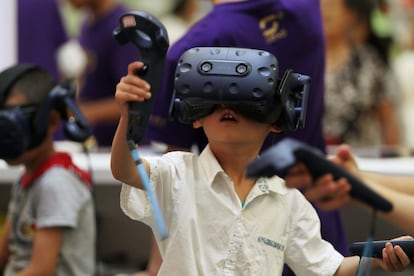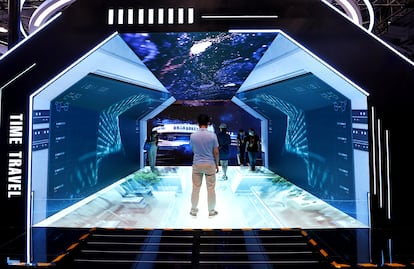China’s metaverse aims to use high-tech to suppress subversion
A public-private sector partnership is developing a digital environment closely linked to national security objectives

The Chinese government has already jumped on the metaverse bandwagon, that immersive digital world being developed by companies like Meta. But the country’s leaders don’t intend to compete with the US for primacy in this new race – they want to build a domestic metaverse tailored to Chinese Communist Party (CCP) objectives. It’s a vision that enables the private sector to develop key technology for the Asian giant, but also maintains what the government euphemistically calls “social peace.”
The state machinery’s wheels are already turning. In 2021, more than 10,000 metaverse-related trademarks were registered in China, compared to less than 1,000 in 2020 and 2019. So far in 2022, 16,000 trademark applications have been submitted. China’s tech giants – Tencent, Alibaba and Baidu – are investing heavily in the metaverse, although at levels far below Meta and Microsoft. ByteDance, the company behind TikTok, video game platform BiliBili and augmented reality (AR) glasses developer Nreal are some other Chinese companies making moves into the metaverse. Morgan Stanley estimates the Chinese metaverse (Chinaverse) market size at $8 trillion, and J.P. Morgan predicts that it could triple China’s gaming market from $44 billion to over $131 billion.
The China Institute of Contemporary International Relations (CICIR) a leading Chinese think-tank, officially kicked-off the Chinaverse initiative in October 2021. A few days after Meta CEO Mark Zuckerberg announced his all-in bet on the metaverse, CICIR released “The Metaverse and National Security,” an analysis of the national security challenges posed by this new environment. In what is considered to be the CCP’s first official statement on the subject, the CICIR report says, “It [the metaverse] will have a major social, political and economic impact on countries… and on political and cultural security… it could bring about major changes in the social structure.” Conclusion: China needs to be part of the metaverse, but wants it to be well controlled.

The same month, China created its Metaverse Industry Committee (MIC), a state-backed group for coordinating metaverse development with scientists and nearly 150 technology companies. In May, MIC Secretary General Luo Jun said: “We are going to embrace the fourth generation of the internet, which will be the era of the metaverse.” That means “serving our country by promoting the development of the new digital world and the digital economy,” wrote Wu Zhongze, former vice minister of science and technology.
Others have been more critical. Chinese economist and online celebrity Ren Zeping warned that the metaverse could cause a decline in marriage and birth rates if people spend all their time relating to one another in the virtual world. CCP-owned The People’s Daily published several articles last year saying that the public “should be prudent with the current metaverse craze,” and cautioned that people buying virtual assets “could get burned.” The Economic Daily, another state-controlled Chinese media outlet, also stressed the need to control asset speculation in the metaverse.
Government-business alignment
But the die has been cast. This was made clear at the World Metaverse Congress 2022, a major conference in Beijing that brought together major industry players and senior government officials in August. The government launched a fund to support startups focused on the metaverse. Local government action plans are also being established to kick-start research centers and industrial plants. “Like the aerospace industry, it’s a decentralized approach that is coordinated centrally and executed locally,” said Raquel Jorge, a technology policy analyst at the Elcano Royal Institute for International and Strategic Studies (Madrid, Spain). In August, Beijing local authorities presented a two-year plan (2022-2024) along the lines of Shanghai’s plan, which has $51 billion in funding. Wuhan and Hefei are other megacities that are already in the game. “They are creating what the European Union calls smart territories – several interconnected provinces working on the same projects,” said Jorge.
One of the reasons for this decentralized approach is the metaverse technology itself. It’s actually not a single technology, but a combination of artificial intelligence (AI), cloud computing, virtual and augmented reality, blockchain, payment platforms, graphics simulation, robotics and more. “Judging by the moves they have made so far, it appears that they are working on basic industries first to develop innovations that complement existing technologies,” said Jorge.

In 2017, the Chinese government set its sights on being the world leader in AI by 2030, and announced a massive $150 billion investment that far exceeded the capacity of any other country. According to a study by the World Intellectual Property Organization, in 2018, China already owned 57% of the registered AI patents, and 17 of the 20 leading AI institutions in the world were Chinese. All this begs the question – will China pump these kinds of resources into the metaverse?
“China is being reactive. For the time being, it doesn’t consider the metaverse to be a strategic sector. But AI, smart cities, computing and the internet of things are strategic for China, and Beijing knows that dominance in those technologies will give it technological hegemony,” said technopolitics expert Ekaitz Cancela, from Spain’s Internet Interdisciplinary Institute at the Open University of Catalonia. “China watched companies like Meta and Microsoft going all-in, but decided to wait and watch what happens. If the metaverse turns out to be nothing more than a bubble, China will keep making progress with the underlying technologies and apply them in other areas. But if the metaverse is real, then China will be ready to step on the gas and not concede any market share,” said Cancela.
A controlled environment
It’s been almost a year since Meta owner Mark Zuckerberg announced his plans for “the natural evolution of the internet.” The young billionaire described a not-too-distant future in which we will all don AR glasses and spend several hours a day navigating a hyper-realistic digital environment. Everything we see, hear and touch in the metaverse will seem real, but will actually be nothing more than ones and zeros. We will enter this computer-designed world to play, shop, work, interact with friends and play sports.
Zuckerberg’s big bet is, above all, a form of escapism. This is also how Portuguese politician and seasoned China watcher Bruno Maçães sees it. “I do see one way to reconcile the metaverse with CCP interests. Rather than using the metaverse to invent purely imaginary worlds, it would be possible to use it to create altered versions of the real world,” wrote the former Portuguese secretary of state for European affairs in City Journal.

China is already exploiting the metaverse to promote regime loyalty. “The government has set up a CCP teaching center to foster patriotic values. Beijing views this as a pandemic-resistant avenue for immersive training. They are also working on a virtual factory concept that will drastically reduce energy, water and raw material consumption by avoiding the need to develop prototypes prior to the production process,” said Manu Monasterio, a professor of artificial intelligence and metaverse immersive marketing artificial intelligence, who is also a China expert who has lived in the country for over a decade.
Chinese citizens are the dream target of metaverse boosters. Sixty-two percent of young people play video games on a daily basis, the field in which the metaverse currently has the greatest potential. According to a survey by the World Economic Forum, 75% of the Chinese population say they know what the metaverse is, compared with 28% of the French public.
Nevertheless, anyone who wants in on the Chinaverse must pass muster with the government. This is already the case with video games, which are heavily regulated. Before going to market, games must first be approved by Beijing, which prohibits any content considered obscene or with excessive blood and violence. Reuters reports that the Chinese government is studying a registration system for metaverse communities aimed at preventing them from influencing wider public opinion and causing economic or financial shocks. One American businessman with several projects in China told Reuters that when Chinese consumers are ready to give metaverse-related technology a shot, “… then there will be mass adoption at a level that I don’t think will happen in the West nearly as quick.”
Tu suscripción se está usando en otro dispositivo
¿Quieres añadir otro usuario a tu suscripción?
Si continúas leyendo en este dispositivo, no se podrá leer en el otro.
FlechaTu suscripción se está usando en otro dispositivo y solo puedes acceder a EL PAÍS desde un dispositivo a la vez.
Si quieres compartir tu cuenta, cambia tu suscripción a la modalidad Premium, así podrás añadir otro usuario. Cada uno accederá con su propia cuenta de email, lo que os permitirá personalizar vuestra experiencia en EL PAÍS.
¿Tienes una suscripción de empresa? Accede aquí para contratar más cuentas.
En el caso de no saber quién está usando tu cuenta, te recomendamos cambiar tu contraseña aquí.
Si decides continuar compartiendo tu cuenta, este mensaje se mostrará en tu dispositivo y en el de la otra persona que está usando tu cuenta de forma indefinida, afectando a tu experiencia de lectura. Puedes consultar aquí los términos y condiciones de la suscripción digital.









































